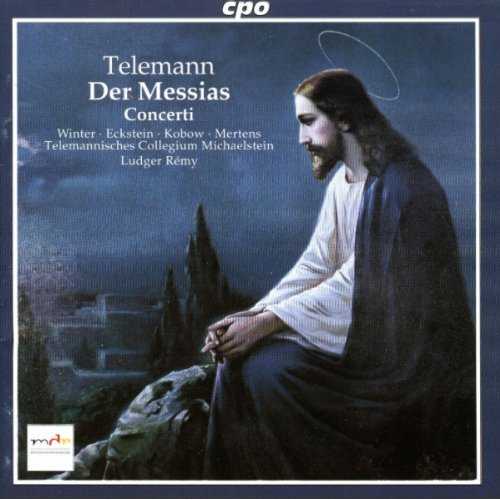
Performer: Telemannisches Collegium Michaelstein, Veronika Winter, Jan Kobow
Conductor: Ludger Remy
Composer: Georg Philipp Telemann
Audio CD
SPARS Code: DDD
Number of Discs: 1
Format: APE (image+cue)
Label: Cpo Records
Size: 260 MB
Recovery: +3%
Scan: yes
01. Der Messias, TWV 6:4: Part I: Sing, unsterbliche Seele
02. Der Messias, TWV 6:4: Part I: Vergebens erhub sich Satan
03. Der Messias, TWV 6:4: Part I: Prachtig
04. Der Messias, TWV 6:4: Part I: Aber, o Werk, das nur Gott allgegenwartig
05. Der Messias, TWV 6:4: Part I: Sterbliche, kennt ihr die Ehre
06. Der Messias, TWV 6:4: Part I: Gott kam selber vom Himmel herab
07. Der Messias, TWV 6:4: Part II: Vorspiel
08. Der Messias, TWV 6:4: Part II: Mirjams, und deine Wehmut, Deborah
09. Der Messias, TWV 6:4: Part II: Schonster unter den Menschen!
10. Der Messias, TWV 6:4: Part II: Symphonie
11. Der Messias, TWV 6:4: Part II: Mirjam, sein Auge verlischt
12. Septet in A minor, TWV 44:42: I.
13. Septet in A minor, TWV 44:42: II.
14. Septet in A minor, TWV 44:42: III. Affetuoso
15. Septet in A minor, TWV 44:42: IV. Vivace
16. Quintet in F major, TWV 44:11: I. Affettuoso
17. Quintet in F major, TWV 44:11: II. Allegro
18. Quintet in F major, TWV 44:11: III. Adagio
19. Quintet in F major, TWV 44:11: IV. Presto
20. Quartet in E flat major, TWV 43: Es1: I. Grave
21. Quartet in E flat major, TWV 43: Es1: II. Allegro
22. Quartet in E flat major, TWV 43: Es1: III. Andante
23. Quartet in E flat major, TWV 43: Es1: IV. Allegro
Telemann Treasures
Georg Philipp Telemann (1681-1767) has suffered from comparison with his four-years-younger contemporaries, J. S. Bach and George Frederick Handel. This, plus his enormous catalog of works, has made it difficult to get a fix on him as a major composer. But major he was, and he is finally, in these days of CD riches, getting many recordings.
This one gives us works from the two ends of his very long career. There are three early instrumental works–each a kind of sonata da chiesa, each filled with contrapuntal mastery, each with tunes galore–and a major vocal-instrumental work, the setting of words from Klopstock’s ‘Messias’ (‘The Messiah’). The instrumentalists are members of the Telemann Collegium Michaelstein, directed by Ludger Rémy. In the ‘Messias’ the soloists are Veronika Winter, soprano, Marion Eckstein, alto, Jan Kobow, tenor, and Klaus Mertens, bass.
The three sonatas (actually entitled, ‘Partie,’ ‘Sonata,’ and ‘Concerto’ respectively–roughly interchangeable terms in those days, the first decade of the 1700s) are each about 8 minutes long, in four movements, and comprising 7, 5, and 4 parts (counting the basso continuo as one part) respectively. They are far more contrapuntal than the much later ‘Messias.’ The seven-voice ‘Partie’ [TWV 44:42 in A minor] is particularly attractive using, as it does, 2 recorders, 2 oboes, 2 violins and a basso continuo consisting of bassoon, cello, violone and harpsichord. All three are attractively and spiritedly played and recorded in exceptionally vivid sound.
The main attraction, and certainly the largest piece here, is the two-section ‘Messias,’ written in the 1750s and at a period when Telemann’s style had begun to veer toward the simpler so-called ‘style galant.’ One hears a strong French influence and at times one is reminded of the music of Jean-Philippe Rameau, particularly in Part I. (It is eerie to hear what sounds like Rameau but with German text!) The text for this mini-Passion is from the 1st and 10th cantos of ‘The Messiah’ by Friedrich Gottlieb Klopstock (1724-1803), a long poetic work in strict hexameters, much celebrated in its time. (Klopstock is best remembered by non-German music-lovers as the poet whose words are used by Mahler in his ‘Resurrection’ Symphony, or by those who have paid close attention to the libretto of Gounod’s ‘Faust.’) The texts used are generally somber and are set off by instrumental ‘symphonies’ that come between the vocal pieces and which set the mood. The second part features two delectable duets by the old-Testament singers, Miriam and Deborah, anachronistically singing about Jesus’s crucifixion and death. Soprano Winter and Alto Eckstein are superb when they sing individually and all the more so when their voices combine in sweet-toned counterpoint.
For those who like music from the late German Baroque but who know Telemann only from a few of his innumerable concerti or other instrumental works such as the Tafelmusik, I’d strongly recommend this disc. These performances are not likely to be bettered in the foreseeable future. The only other recording I know is on the hard-to-find Christophorus label and is easily surpassed by this one.
TT=57:36
Scott Morrison